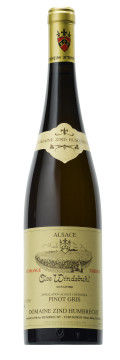
Technical presentation
| Bottling : | September 2006 |
|---|---|
| Acquired alcohol : | 13.3 ° |
| Residual sugar : | 91 g/l |
| Total acidity : | 4.3 g/l H2SO4 (6.6 g/l Acide Tartrique) |
| pH : | 3.6 |
| Yield : | 32.5 hl/ha |
| Grape variety : | Pinot Gris |
| Terroir : | Clos Windsbuhl |
| Sweetness index : | VT |
| Soil : | Muschelkalk calcareous, South/South East facing |
Description of the wine Pinot Gris Clos Windsbuhl 2005 - Vendange Tardive
The Clos Windsbuhl is located on a small 16 acres hill above the village of Hunawihr. It enjoys a less precocious climate which is reinforced by the poor calcareous soil. The Clos Windsbuhl produces delicate wines with great acidity balance, even if they can reach sometimes very high level of ripeness due to noble rot. 2005 is a wonderful vintage for Windsbuhl. The grapes reached perfect ripeness and acidity balance, and just before harvest, the noble rot transformed the grapes into small rich sweet little berries. The Pinot-Gris produced a selection de Grains Noble and a Vendange Tardive in 2005. The textbook and easy fermentation lead to a classic 13%+6%pot balance.

Tasting notes
01/2007 : The nose already shows all the aromatic potential of the wine: a combination of honey, apricots, wax and the classic Windsbuhl minerality. I expect this wine to develop much more in the future, in the direction of the great 2002 or 1994. The palate is still compact (that’s the character of 2005!) almost refusing to reveal the huge sweetness. The aromatics are just a continuity of the nose with perhaps even more stony mineral effect. A wine to keep !

The Clos Windsbuhl of Hunawihr
The altitude of the vineyard coupled with Hunawihr’s tardy climate means that the Clos Windsbuhl is often one of the last of our vineyards to be harvested. This explains the aromatic quality of the Clos’ wines and the consistent balance of acidity, a guarantee of good ageing. Although often harvested late, the Windsbuhl grapes are only rarely botryitized, doubtless due to the altitude of the vineyard, but nevertheless often reach high levels of maturity.